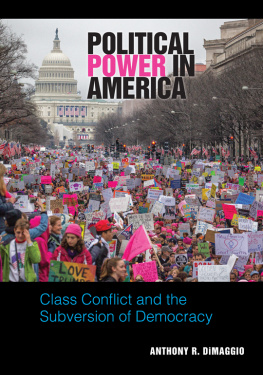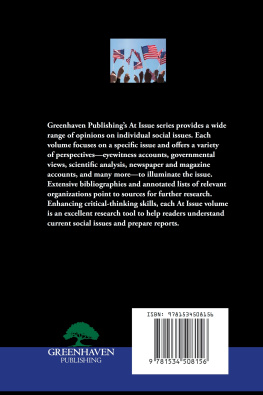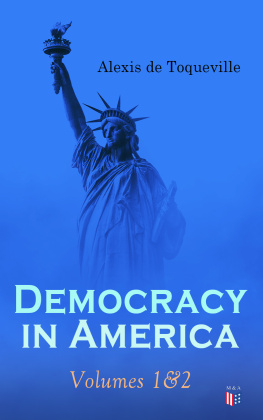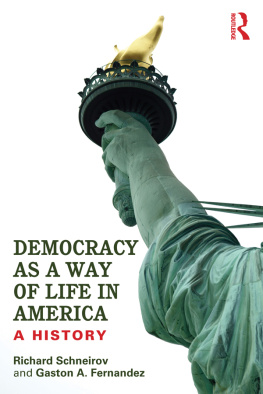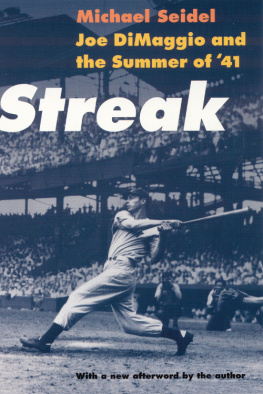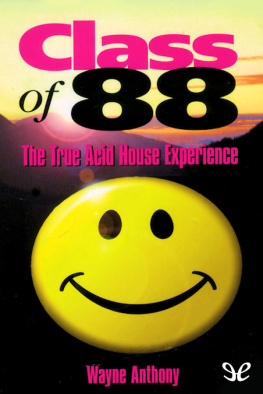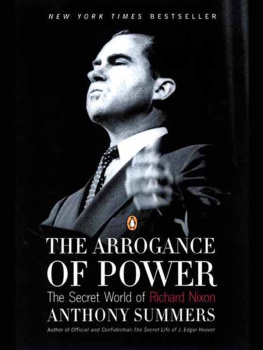Political Power in America
Political Power in America
Class Conflict and the Subversion of Democracy
Anthony R. DiMaggio
Cover image: Wikipedia.org / Womens March on Washington on January 21, 2017
Published by State University of New York Press, Albany
2019 State University of New York Press
All rights reserved
Printed in the United States of America
No part of this book may be used or reproduced in any manner whatsoever without written permission. No part of this book may be stored in a retrieval system or transmitted in any form or by any means including electronic, electrostatic, magnetic tape, mechanical, photocopying, recording, or otherwise without the prior permission in writing of the publisher.
For information, contact State University of New York Press, Albany, NY
www.sunypress.edu
Library of Congress Cataloging-in-Publication Data
Names: DiMaggio, Anthony R., 1980 author.
Title: Political power in America : class conflict and the subversion of democracy / Anthony R. DiMaggio.
Description: Albany : State University of New York, [2019] | Includes bibliographical references and index.
Identifiers: LCCN 2018059960 | ISBN 9781438476933 (hardcover : alk. paper) | ISBN 9781438476940 (pbk. : alk. paper) | ISBN 9781438476957 (ebook)
Subjects: LCSH: Power (Social sciences)Political aspectsUnited States. | Political participationSocial aspectsUnited States. | Social conflictPolitical aspectsUnited States. | Elite (Social sciences)Political activityUnited States. | Protest movementsPolitical aspectsUnited States. | DemocracyEconomic aspectsUnited States. | NeoliberalismUnited States.
Classification: LCC JK275 .D55 2019 | DDC 320.473dc23
LC record available at https://lccn.loc.gov/2018059960
10 9 8 7 6 5 4 3 2 1
Contents
Illustrations
Tables
Images
Figures
Acknowledgments
This bookin various formshas been in the works for nearly a decade. I began using chapters of it in my American Government introductory course in the early 2010s and used it continuously throughout the decade. During that time, the work was read by hundreds of undergraduate students, many of which provided valuable feedback on earlier drafts and on how to improve them. I want to thank these students for their insights, which have undoubtedly made this a better book. From my experiences, I have learned that students are hungry for a critical introduction to American politics. Unfortunately, the vast majority of American government texts have little to offer by way of critical analysis. This book is meant to address this deficiency in the discipline, and I hope it is as valuable to students in the future as it has been to those in the past.
I also want to thank my family for their support and patience during my countless hours working on this project. Most of all I am grateful to my wife, Mary, and sons Frankie and Tommy, for their unconditional support and love during the trying months in which I was completing this book. I also want to extend thanks to my parents and siblings for their support over the years during the development of my academic career.
Special thanks are also due to my peers and friends at Lehigh University. The university and my department provided valuable resources in helping with the preparation of the manuscript. I particularly want to thank Rick Matthews for taking the time to read and provide constructive feedback as related to my historical analysis of the founding era. His comments were significant in terms of improving the book.
Finally, I would like to thank a variety of fellow scholars, whose works have been instrumental to my own intellectual development as a radical scholar. Thanks go to many people, including Henry Giroux, Amentahru Wahlrab, Noam Chomsky, Michael Parenti, Robert McChesney, Andy McFarland, Andy Rojecki, Mark Major, Carlos Parodi, Ali Riaz, Jamal Nassar, Chris McDonald, John Vinzant, Colin Suchland, David Reynolds, and my editor at SUNY Press, Michael Rinella, for his patience in working with me over the last few years on this book.
Introduction
A Class Analysis of the American Political System
We live in a time when political officials manipulate information with minimal consequences. Many Americans political opinions are formed independently of evidence-based reasoning. Political officials regularly misrepresent reality, as seen in the 2016 presidential election. The non-partisan fact-checking group Politifact analyzed statements made by presidential candidates, finding that only a third of them were true. For the Democrats, 53 percent of Hillary Clintons statements were true, compared to 51 percent for Bernie Sanders.
The publics tolerance of manipulative official rhetoric represents a fundamental threat, in that democracy is premised upon citizens making informed political decisions. The prevalence of deception in American politics suggests that the political system no longer serves the interests of the many. Instead, our system increasingly serves the interests of the American upper classas represented by large corporations, business leaders, and the professional class that is attached to corporate America. In this vein, I echo the claims of previous critical scholars, such as political scientist Michael Parenti, who documents upper-class dominance of public life, including politics, by business interests.
A Marxist analysis of American politics places economicsand particularly the corporate class and business elitesat the center of political power. Through a historical materialist analysis, the Marxist framework envisions upper-class and business interests as dominant over other realms of public life, including political institutions, the media, individual identities, and social interactions. Power in society has an economic foundation, which determines how various social institutions function. One need not be a Marxist, however, to believe that business and upper-class interests play a dominant role in influencing the political process, as most Americans see government as controlled by the wealthy. I adopt a broader framework in this book than simply talking about the business class. The American upper-class includes business interests, but also trade associations that are tightly linked to corporate interests, and professional associations. These professional groups include doctors, lawyers, engineers, and other service-based professionals, who operate within the capitalist system working for major corporations, although others may be employed by public institutions or be self-employed. It is this upper class, and particularly its core corporate component, with which I am interested.
It is common today to hear Americans complain about the role of money in elections. But this is only one part of upper-class power in politics. The link between interest groups giving campaign donations and favorable votes on policies from legislators is inconsistent at best. Rather, a more expansive view of American political power is needed. This expanded view recognizes that politics is heavily dominated by corporate interests, with the political system itself being captured by the wealthy. This domination occurs in numerous ways, with wealthy Americans increasingly comprising the political elite who run Washington, with bureaucratic officials being courted and captured by business lobbies, with corporate media reinforcing a pro-business ideology via news and entertainment media, and with political officials and media directing public attention away from political discussions in an age of mass political demobilization. The demobilization of the public makes it increasingly difficult to challenge upper-class political power. The masses are relegated to the sidelines due to the growth in anti-government rhetoric from political leaders, which turns the public off from politics. Simultaneously, the rising prominence of non-political, diversionary mass-media entertainment programming also diverts Americans from political matters.


